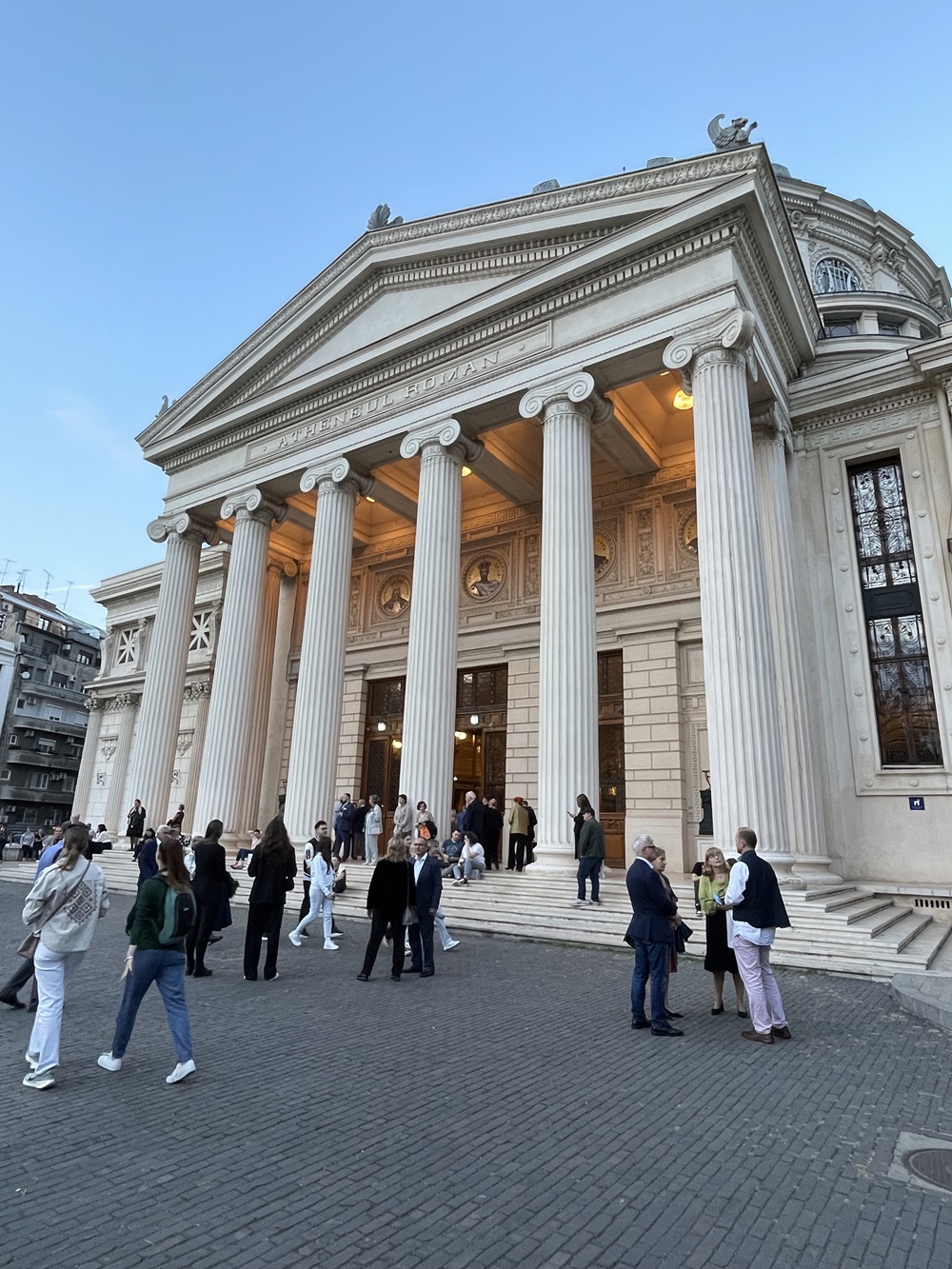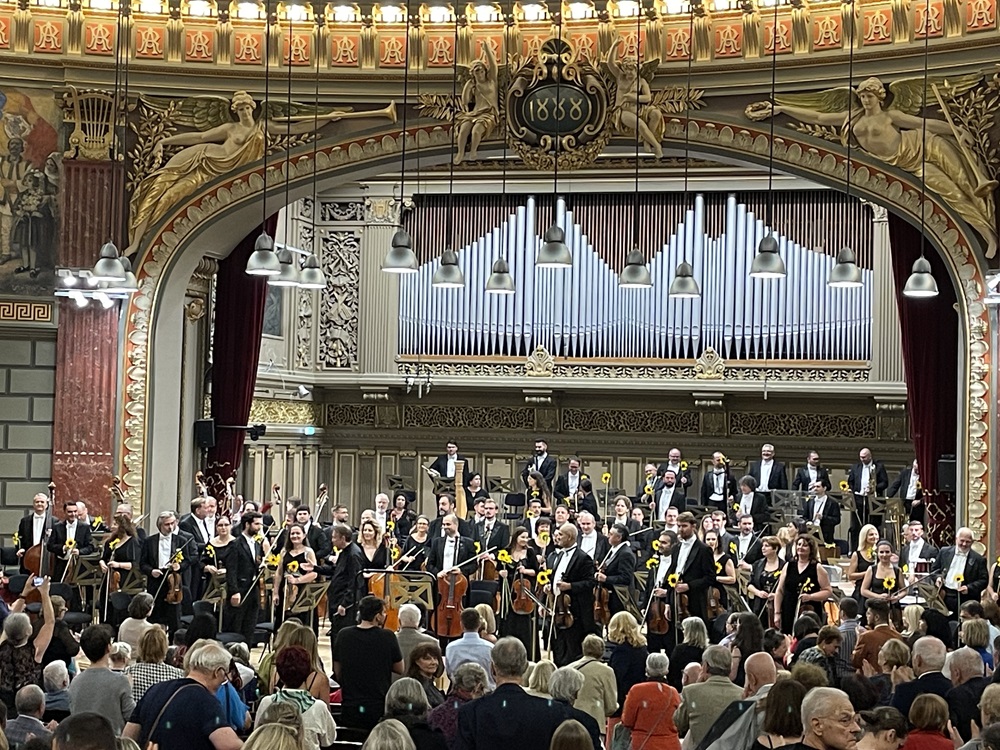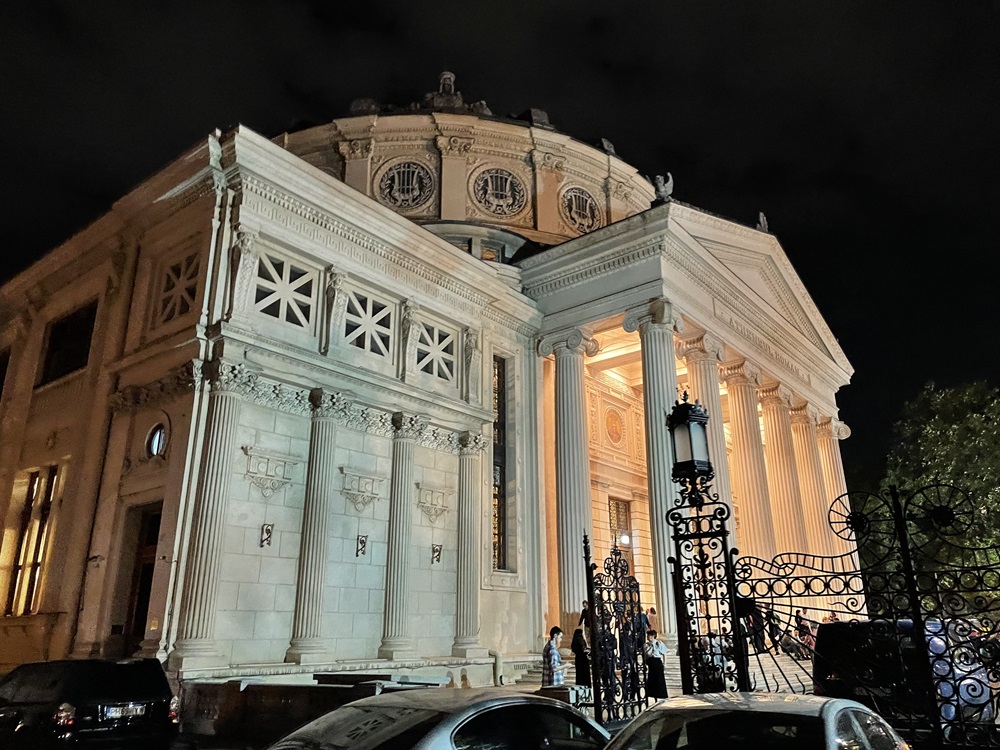Pe data de 4 octombrie 2024, deschiderea stagiunii simfonice 2024-2025. Orchestra simfonică a Filarmonicii George Enescu, dirijată de Mikhail Pletnev, alături de solista Ioana Cristina Goicea a dat un ton superb sezonului care se încheie în iunie 2025 (fge.org.ro/calendar).
S-a întâmplat să am mai mult timp liber înainte de concert, așa că m-am așezat la un ecler. Într-o zi caldă de toamnă, în timp ce pe stradă se auzea cum un suflător exersa Ravel, am observat cum soseau și parcau instrumentiștii pe stradă, și cum intrau în Ateneu pe intrarea dinspre strada Constantin Esarcu.
O așezare atipică a instrumentiștilor din orchestră, unde vioara I și contrabasul sunt ambele pe partea stângă a dirijorului, este cel mai des asociată cu dispunerea modernă (sau simfonică). Această dispunere modernă este menită a echilibra mai bine sunetul între coarde și restul instrumentelor orchestrei și a oferi o simetrie mai bună între viori și celelalte instrumente de coarde.
Mikhail Pletnev a apărut pe scenă tiptil, în liniște, cumva parcă nici nu era. Dar totuși, foarte era. Pletnev este cunoscut pentru firea sa enigmatică și uneori retrasă. Deși a cunoscut succes internațional, preferă să își trăiască viața într-un mod discret, departe de lumina reflectoarelor. În această așezare a orchestrei, alături de acest dirijor, apare minunata Ioana Cristina Goicea. Sibelius a sunat ireal în această constelație. Înainte de care publicul a avut parte de Amurg de toamnă, de Alfred Alessandrescu iar după pauză a urmat Aleksandr Glazunov, cu ale sale Anotimpuri, op. 67.
Aleksandr Glazunov (1865-1936) a fost unul dintre cei mai importanți compozitori ruși de la sfârșitul secolului XIX și începutul secolului XX, având un stil care îmbină tradițiile romantice rusești cu influențe occidentale. Anotimpurile (în franceză, Les Saisons), op. 67 este una dintre lucrările sale cele mai populare și fascinante, fiind un balet simfonic compus în 1899, ce oferă un spectacol muzical plin de farmec și culoare. Este o lucrare care se bazează pe evocarea poetică a celor patru anotimpuri fiecare având propria secțiune distinctă. Glazunov a compus Anotimpurile în doar câteva săptămâni, demonstrând viteza și eficiența sa de a crea lucrări complexe. În ciuda rapidității cu care a fost scrisă, muzica este extrem de bine structurată, plină de subtilități și momente de lirism. Această lucrare, sub bagheta lui Pletnev, a sunat magic.
Nici trei minute vă propun și vă cer să ascultați. E despre vară:
Și da, anul 2024 marchează împlinirea a 100 de ani de la moartea compozitorului francez Gabriel Fauré (1845-1924), fiind astfel un an important de comemorare a vieții și operei sale. Fauré a murit pe 4 noiembrie 1924, iar contribuțiile sale la muzica franceză și la muzica clasică occidentală, în general, sunt foarte apreciate, în special în genuri precum liedul (mélodie), muzica pentru pian, muzica de cameră și muzica sacră.
Vineri 4 octombrie 2024, ora 19:00, Ateneul Român
Orchestra simfonică a Filarmonicii George Enescu
Dirijor: Mikhail Pletnev
Solistă: Ioana Cristina Goicea
Program: Alfred Alessandrescu - Amurg de toamnă / Jean Sibelius - Concertul în re minor pentru vioară și orchestră, op. 47 / Aleksandr Glazunov - Anotimpurile, op. 67
On the 4th of October 2024, in the Bucharest Atheneum, the opening of the 2024-2025 symphonic season took place. The symphony orchestra of the George Enescu Philharmonic, conducted by Mikhail Pletnev, together with soloist Ioana Cristina Goicea set a superb tone for the season that ends in June 2025. (fge.org.ro/calendar)
I happened to have more free time before the concert, so I sat down at an éclair on the street next to the hall. On a warm autumn day, while on the street you could hear how an instrumentalist was practicing Ravel. While I was observing how the instrumentalists arrived and parked on the street, and how they entered the Athenaeum through the entrance from Constantin Esarcu Street.
In an atypical arrangement of instrumentalists in the orchestra, where the first violin and double bass are both on the left side of the conductor is most often associated with the modern (or symphonic) arrangement. This modern arrangement is to better balance the sound between the strings and the rest of the orchestra's instruments, and to provide better symmetry between the violins and the other string instruments.
Mikhail Pletnev appeared on stage tidily, quietly, somehow, as if he wasn't even there. But he was massively present. Pletnev is known for his enigmatic and sometimes withdrawn nature. Although she has experienced international success, she prefers to live her life in a discreet way, away from the spotlight. In this arrangement of the orchestra, next to this conductor, the wonderful Ioana Cristina Goicea appeared. Sibelius, sounded unreal in this constellation. Before that, the audience had Autumn Twilight, by Alfred Alessandrescu and after the break followed Aleksandr Glazunov, with his Seasons, op. 67.
Aleksandr Glazunov (1865-1936) was one of the most important Russian composers of the late nineteenth and early twentieth centuries, with a style that blended Russian romantic traditions with Western influences. The Seasons (in French, Les Saisons), op. 67, is one of his most popular and fascinating works, being a symphonic ballet composed in 1899, which offers a musical spectacle full of charm and color. It is a work that is based on the poetic evocation of the four seasons, each having its own distinct section. Glazunov composed "The Seasons" in just a few weeks, demonstrating his speed and efficiency in creating complex works. Despite the speed with which it was written, the music is extremely well structured, full of subtleties and moments of lyricism. This work, under the baton of Pletnev, sounded magical.
I am proposing and ask less then 3 minutes from you. It's about summer:
And yes, the year 2024 marks the 100th anniversary of the death of French composer Gabriel Fauré (1845-1924), making it an important commemorative year for celebrating his life and work. Fauré passed away on November 4, 1924, and his contributions to French music and Western classical music in general are highly regarded, particularly in genres such as art song, piano music, chamber music, and sacred music.
Un éclair, un an aniversar Fauré și deschiderea stagiunii simfonice / An éclair, a Fauré anniversary year and the opening of the symphonic season
Nora Dobre
0 comentarii
Resurse
Alte articole de Nora DobreAlte cronici muzicaleArticole similare
Nu extraordinarul / Not the fancy / Nora DobreRiscant / Risky / Nora DobrePozele de la opera / Taking pictures at the opera / Nora DobreÎmi place Elgar / I love Elgar / Nora DobreDin lumea nouă / From the New World / Nora DobreToate articolele despre ConfluenceScrieţi la LiterNet
Scrieţi o cronică (cu diacritice) a unui eveniment cultural la care aţi participat şi trimiteţi-o la [email protected] Dacă ne place, o publicăm.
Vreţi să anunţaţi un eveniment cultural pe LiterNet? Îl puteţi introduce aici.
Publicitate



